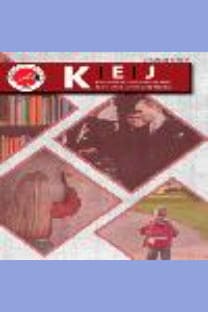Türkiye’de COVID-19 Salgını Sürecinde Milli Eğitim Bakanlığı Tarafından Atılan Politika Adımları
Ülkeler tüm dünyada devam eden COVID-19 salgını nedeniyle oluşan yeni durumlarla mücadele etmekte, eğitim yöneticileri öğrencilerin eğitim ihtiyaçlarını çevrimiçi platformlar ve uzaktan eğitim çözümleri aracılığıyla karşılamak için çaba göstermektedir. Milyarlarca öğrenci ve milyonlarca eğitimci salgın nedeniyle okulların kapanması ve diğer sınırlamalardan etkilenmiştir. Bu çalışmada, Türkiye’de COVID-19 salgını sürecinde eğitim hizmetlerinin devam etmesi ve toplumun ihtiyaçlarının eğitim kurumlarında gerçekleştirilen üretimlerle karşılanması için Milli Eğitim Bakanlığı (MEB) tarafından atılan adımlar değerlendirilmiştir. Türkiye’de okulların kapanması kararı ile MEB etkin bir uzaktan eğitim sistemi kurmak için dijital eğitim platformu olarak hizmet veren Eğitim Bilişim Ağı’nın (EBA) altyapısını güçlendirmiş ve Türkiye Radyo Televizyon Kurumu (TRT) ile işbirliği yapmıştır. Mesleki ve teknik eğitim (MTEK) kurumları üretim ve uyum potansiyellerinden yararlanarak toplumun salgın günlerindeki taleplerini karşılamada çok büyük bir katkı sağlamıştır. COVID-19’un yol açtığı olumsuz psikolojik etkiler ile başa çıkmak için MEB, yardım hattı ve rehberlerden oluşan bir psikososyal destek sistemi kurmuştur. Sonuç olarak MEB, öğrencileri akademik ve sosyal açıdan destekleyen bir uzaktan eğitim sistemi kurmuş, psikososyal destek sistemini hayata geçirmiş ve MTEK kurumlarının salgın günlerinde ihtiyaç duyulan materyalleri üretmesini sağlamıştır.
Anahtar Kelimeler:
COVID-19, Koronavirüs, Milli Eğitim Bakanlığı, Politika Adımları, Eğitim Politikaları
Educational Policy Actions by the Ministry of National Education in the times of COVID-19 Pandemic in Turkey
Countries struggle with the new situations due to COVID-19 pandemic around the world, and educational authorities strive for meeting the educational needs of students by using different online portals and distance education solutions. Billions of students and millions of educators are affected by school closures and other restrictions. In this study, I review the educational policy actions in Turkey by Ministry of National Education (MoNE) to maintain educational services, and to meet the needs of society with the productions of educational institutions in COVID-19 pandemic days. With school closures in Turkey, MoNE strengthened the infrastructure of digital educational portal, Educational Informatics Network (EBA) and collaborated with Turkish Radio and Television Corporation (TRT) to establish an effective distance education system. Vocational education and training (VET) institutions have made great contributions to meet the needs of the society via its potential in production and adaptation. To cope with the negative psychological effects of COVID-19, MoNE established a psychosocial support system involving specific helpline and guides. Consequently, MoNE quickly established an extensive distance education environment which supports students academically and socially, developed psychosocial support system, and used VET institutions to produce the needed materials and equipment in pandemic days.
Keywords:
COVID-19, Coronavirus, Ministry of National Education, Policy, Policy Actions,
___
- Burgess, S., & Sievertsen, H. H. (2020). Schools, skills, and learning: The impact of COVID-19 on education. CEPR Policy Portal. Retrieved from https://voxeu.org/article/impact-covid-19-education
- Education Cannot Wait – ECW (2020). The fierce urgency of now!: Education in emergency response to COVID-19. ECW Policy Reports.
- ETF (2020). Coping with COVID-19: Mapping education and training responses to the health crisis in ETF partner countries. Torino, Italy: ETF Publishing.
- Hopegood, S. (2020). Coronavirus: Our principles, values, and shared humanity. Worlds of Education. Retrieved from https://www.worldsofeducation.org/en/woe_homepage/woe_detail/16719/%C2%AB-coronavirus-nos-principes-nos-valeurs-et-notre-humanit%C3%A9-commune-%C2%BB-par-susan-hopgood
- Moreno, J. M., & Gortazar, L. (2020). Schools’ readiness for digital learning in the eyes of principals. An analysis from PISA 2018 and its implications for the COVID19 (Coronavirus) crisis response. World Bank Blogs. Retrieved from https://blogs.worldbank.org/education/schools-readiness-digital-learning-eyes-principals-analysis-pisa-2018-and-its?CID=WBW_AL_BlogNotification_EN_EXT
- OECD (2020). A framework to guide an education response to the COVID-19 Pandemic of 2020. Paris: OECD Publishing.
- Ozer, M. (2018). The 2023 Education Vision and new goals in vocational and technical education. Journal of Higher Education and Science, 8(3), 425–435.
- Ozer, M. (2019a). Reconsidering the fundamental problems of vocational education and training in Turkey and proposed solutions for restructuring. İstanbul Üniversitesi Sosyoloji Dergisi, 39(2), 1–19.
- Ozer, M. (2019b). Background of problems in vocational education and training and its road map to solution in Turkey’s Education Vision 2023. Journal of Higher Education and Science, 9(1), 1–11.
- Ozer, M., & Suna, H. E. (2019). Future of vocational and technical education in Turkey: Solid steps taken after Education Vision 2023. Journal of Education and Humanities, 10(20), 165–192.
- Ozer, M., & Perc, M. (2020). Dreams and realities of school tracking and vocational education. Palgrave Communications, 6, 34.
- Ozer, M., & Suna, H. E. (2020). The linkage between vocational education and labor market in Turkey: Employability and skill mismatch. Kastamonu Education Journal, 28(2), 558–569.
- Ozer, M. (2020). Vocational Education and Training as “A Friend in Need” During Coronavirus Pandemic in Turkey. Bartın University Journal of Faculty of Education, 9(2), 1-7.
- Perc, M., Ozer, M., Hojnik, J. (2019). Social and juristic challenges of artificial intelligence. Palgrave Communication 5, 61.
- Reimers, F. M. (2020). What the Covid-19 Pandemic will change in education depends on the thoughtfulness of education responses today. Worlds of Education. Retrieved from https://www.worldsofeducation.org/en/woe_homepage/woe_detail/16727/%E2%80%9Cwhat-the-covid-19-pandemic-will-change-in-education-depends-on-the-thoughtfulness-of-education-responses-today%E2%80%9D-by-fernando-m-reimers
- Saavedra, J. (2020). Educational challenges and opportunities of the Coronavirus (COVID-19) pandemic. World Bank Blogs. Retrieved from https://blogs.worldbank.org/education/educational-challenges-and-opportunities-covid-19-pandemic
- UNESCO (2020). How are countries addressing the Covid-19 challenges in education? A snapshot of policy measures. Global Education Monitoring Reports. France: United Nations Educational, Scientific and Cultural Organization.
- UNESCO (2020, March 27). Teacher Task Force calls to support 63 million teachers touched by the COVID-19 crisis. UNESCO. Retrieved from https://en.unesco.org/news/teacher-task-force-calls-support-63-million-teachers-touched-covid-19-crisis
- ISSN: 1300-8811
- Yayın Aralığı: Yılda 4 Sayı
- Başlangıç: 1992
- Yayıncı: -
Sayıdaki Diğer Makaleler
Melike ACAR, Ayşegül ÖZEN, Özge KILIÇ
Öğretmen Adaylarının Yaşam Boyu Öğrenme Eğilimleri İle Kütüphane Alışkanlıklarının İncelenmesi
Nilgün YENİCE, Özden Demircioğlu FAYDALIGÜL, Neslihan YAVAŞOĞLU
Zeynep YURTSEVEN AVCI, Funda ERGÜLEÇ, KÜBRA KARAKAYA ÖZYER, Esra EREN
Bir Simülasyon Olarak Eğitim ve Eğitim Programları
Volkan DURAN, Güliz KAYMAKCI, Ahmet ÜNAL
YAP Programlama Öğretim Modelinin Öğrencilerin Bilgi-İşlemsel Düşünme Becerilerine Etkisi
